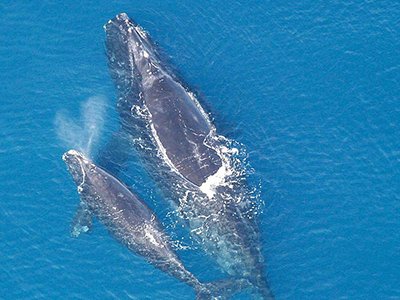Biology Professor Discusses Whale Whispering on Podcast

Susan Parks, professor of biology in the College of Arts and Sciences, was featured on The Decibel, a daily news podcast from The Globe and Mail that provides in-depth context on news stories through conversations with reporters and experts.
Focusing on the critically endangered North Atlantic right whale—a species with fewer than 400 individuals left—the episode explored multiple threats to their survival. While ship collisions, entanglement in commercial fishing lines and the effects of climate change are recognized dangers, scientists are also investigating whether human-caused ocean noise represents an additional factor accelerating their path toward extinction.
Environmental journalist Jenn Thornhill Verma, who has been reporting on the plight of the North Atlantic right whale as part of her Entangled series for The Globe and Mail, explained how scientists are beginning to understand how these whales communicate and how ocean noise affects them.
In the podcast, Parks, whose research specializes in bioacoustics, animal behavior and conservation, discussed the delicate vocalizations between whale mothers and calves. By studying these vocalizations, Parks and her team are investigating whether mothers with young calves communicate more quietly to avoid detection by potential predators.
Understanding this acoustic behavior is critical because human-caused ocean noise—from cargo and cruise ships, underwater drilling and fishing vessels—could interfere with these essential communications. Since a mother's ability to communicate with her young is vital for the calf’s survival, identifying when, where and how loudly these whales vocalize can help researchers and conservationists advocate for noise reduction in key habitats to protect the endangered species.
Parks also discussed the emotional toll of studying these whales, noting how knowing an animal's life history makes each death even more impactful.
"I don't know any North Atlantic right whale that doesn't have a tragic life story if they made it to adulthood," Parks said. "If you just see a whale on the beach and don't know anything about it, it's upsetting. But if you know that that was a 15-year-old animal that just had her first baby and had suffered all of these horrific injuries, it makes it a lot more viscerally upsetting."
Published: Nov. 4, 2025
Media Contact: asnews@syr.edu
